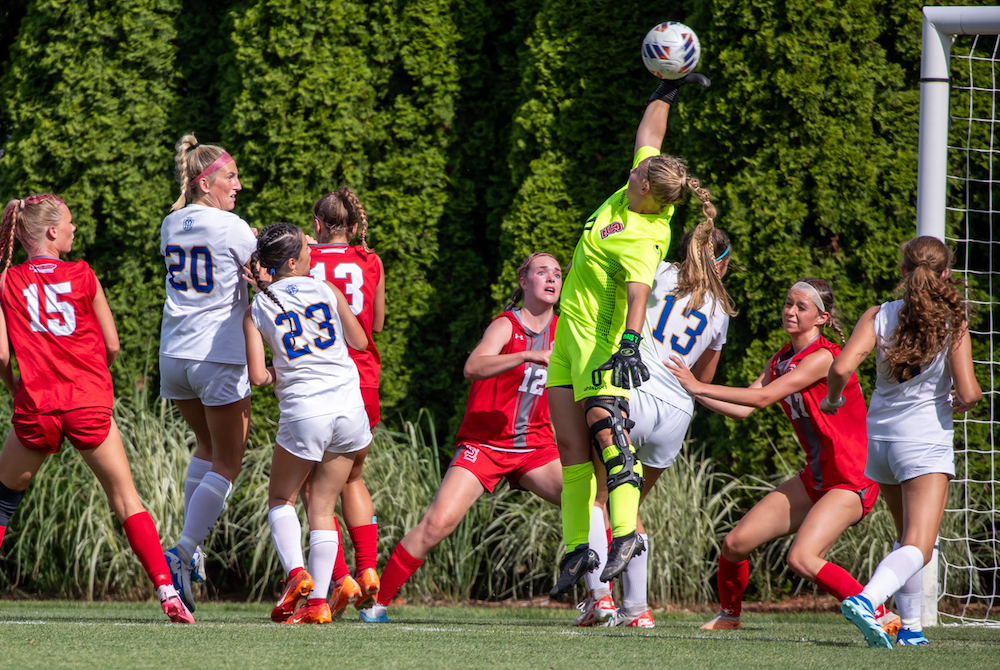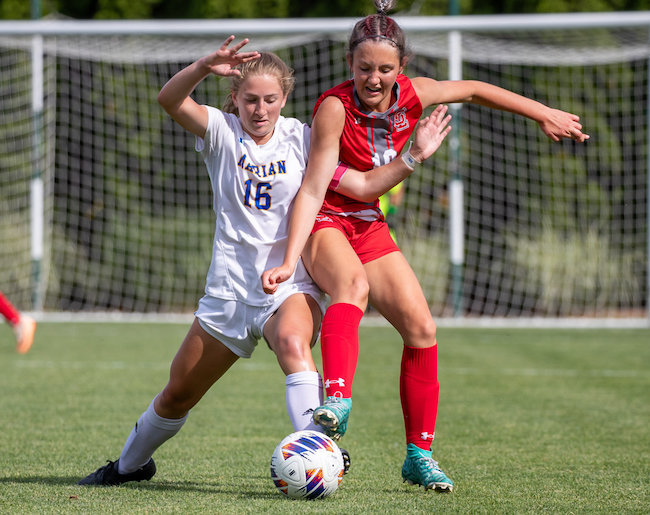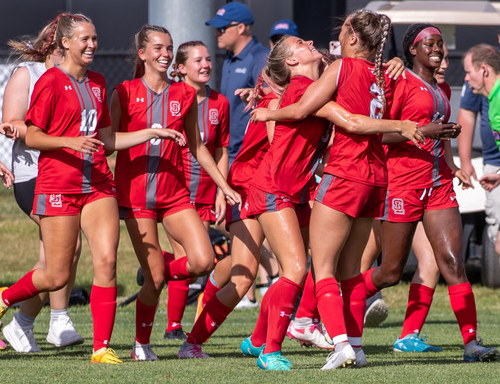
Powerful Voice for High School Sports
December 19, 2014
By Geoff Kimmerly
Second Half editor
Paul Carey was home from the U.S. Army only a few months and just shy of 25 years old when Beal City embarked on its first trip deep into the MHSAA boys basketball tournament.
On the call for local radio station WCEN from gyms at Saginaw Arthur Hill and Lansing Sexton, Carey served as the voice of the previously “laughable” Aggies as they reached the Class D Semifinals before falling just six points short of playing for the title.
“All of Beal City emptied out. They’d never had anything before,” Carey recalled during his annual Thanksgiving weekend visit to the MHSAA Football Finals at Ford Field. “When I got home, within the next two weeks I got a letter from every citizen of Beal City thanking me for broadcasting their games. That’s the kind of appreciation that meant so much.”
During 42 years on the airwaves, Carey was best known as a voice of the Detroit Tigers bounding out of transistor radios all over Michigan, thanks to WJR’s powerful signal.
But for the state’s high school sports community, his legacy is similarly memorable as the voice of the longtime football and basketball scoreboard show and a voter for various all-state teams and wire polls over the decades.
Now 86 and retired since 1991, Carey remains a regular during the first day of the Football Finals, taking in games he broadcast for the MHSAA during the late 1970s and that continue to hold his eye as they have for more than a half-century.
“It was a passion of mine. High school sports always has been,” Carey said. “I think because my dad was a high school coach, and teacher initially, and my brother was a high school coach and teacher, I just grew up in families that appreciated coaching and athletics. I was not a great athlete, but it kept my hand in following sports that way.”
Now, the scores
Carey partnered with Ernie Harwell for Tigers radio broadcasts from 1973-91, including during the march to the 1984 World Series championship. He was named Michigan Sportscaster of the Year six times and to the Michigan Sports Hall of Fame in 1992.
But Carey’s early career included sitting on top of a car, plugged into a phone pole, for a Sacred Heart football game at old Fancher Field just a few blocks from his family’s Mount Pleasant home. Among many more accolades are a Distinguished Service Award from the Michigan High School Coaches Association and a place in the Basketball Coaches Association of Michigan Hall of Fame.
In fact, the start of his weekly announcing of statewide football and basketball scores preceded his baseball career by 16 years and ended two months after he announced his final professional out.
The Michigan High School Scoreboard show was a staple of WJR’s late Friday nights from 1957-91. Carey would read every score he could collect from a variety of sources, often organized by league and with state rankings and context mixed in.
His idea came from something similar read by Len Colby for Kalamazoo’s WKZO. Carey’s brother Terry was coaching at Niles during the second half of the 1950s, and he and other coaches would get together to listen to the Friday night scores from the southwestern part of the state.
Carey, who left WKNX in Saginaw for WJR in 1956, explained to then-sports director Bob Reynolds that the station’s strong signal could provide for a truly statewide scoreboard experience.
Carey then connected with Edgar Hayes of the former Detroit Times, who gave the OK for Carey to call the paper on Friday nights to get scores from the Detroit metro area. For the rest, Carey relied on wire services – there were three at the time – who relied on newspapers from all over Michigan to call in scores over the course of an evening.
Before every Friday during high school football season – and later Tuesdays and Fridays during boys basketball season – Carey typed up lists of games based on schedules in the newspaper, with spaces to add scores. More than a few times, Carey raced down a back ramp at Tiger Stadium after a Friday night game, back to the WJR studio, with 15 minutes to prep for the show’s 11:30 p.m. start.
“If the Flint Journal, the Grand Rapids Press, the Traverse City paper didn’t call in scores to the AP, then I was out of luck too. And that happened all the time,” Carey said. “I would call back occasionally, say, ‘Did you get anything more?’ It was a rat race.”
The show originally was set for 10 minutes and then extended to 15. American Airlines sponsored a record show that followed, and Carey’s scoreboard show had a sponsor only once in 35 years. Finishing up on time was expected, even with more than 200 scores to read.
But Carey said he always went 20 minutes, sometimes 25.
“Because I wasn’t done. I just kept right on going,” Carey said. “Jay Roberts did the all-night show most of the time, and he was patient with me. He didn’t say too much on the air about ‘that guy ahead of me took all of my time.’”
Carey continued the “rat race” until his final scoreboard show, Dec. 20, 1991. He retired from WJR at the end of that calendar year. And it's important to note: Carey was never paid a dime extra for doing the program. .
“I think Paul is really just a sports fan, and that came across to the listener on his broadcasts,” MHSAA historian Ron Pesch said. “Paul would gather as much as possible off the wire. He'd interject if scores were missing from sections of the state. Press polls from the Free Press, News, AP and UPI were big, so he could point out close calls and upsets.
“He provided immediacy, or the closest thing to it in the days before cable TV and the Internet, and because of his scoreboard show, you could get the results before the morning paper. For listeners, he brought life to something as simple as game scores.”
First team all the way
Carey, who resides in Rochester, also served as the engineer on Tigers broadcasts for 16 years, through 1990. He broadcast Pistons games on the radio for six seasons and did the first broadcast of a Central Michigan University football game, in 1949.
Harry Atkins, covering Detroit’s teams while with The Associated Press for 29 years including the last 21 as its sports editor for Detroit, took note of his colleague's hard work – and especially that Carey was one of few broadcasters who was a journalist in addition to a voice.
That made Carey's other major role in high school sports a natural fit.
Atkins split The Associated Press all-state selection panels for football and basketball into 11 regions, and Carey represented the Detroit area for a number of years. He also was a longtime voter in those sports' weekly polls.
“Paul is just that kind of guy. He thought it was important and he made time in his busy schedule to do it,” Atkins said “And it had an impact on the other 10 voters on the All-State panels, too.
“Some of them were from small out-state newspapers or radio or TV stations. Yet every one of them knew who Paul Carey was. And when he spoke, of course, with what often is called "The Voice of God," those voters paid attention.”
And he still does, as well.
At the end of each fall, Carey still puts together a compilation of the three high school all-state football teams – Associated Press, Detroit Free Press and Detroit News – and files them with years of research and results.
“It’s important to me. Nobody sees it but me, but I get a certain kick,” Carey said. “Once in a while I’ll see a kid playing at Central, Western or (Michigan) State or Michigan, and they’ll say he came from Clawson. I’ll go into my all-state collections, say that would’ve been 2009 he played, and I find a name.”
In addition to the Football Finals on WJR, Carey was part of the Baseball Finals broadcasts into the early 1990s, continuing to contribute even after his retirement from his fulltime gig.
He spent high school games over the years sitting next to legends like the Free Press’ Hal Schram and remembers when current Free Press longtime scribe Mick McCabe was just a rookie. One of Carey's final broadcasts was a 1992 Baseball Final with his nephew Mike Carey, who continues to broadcast MHSAA championship games to this day.
“I am eternally grateful to Paul Carey. His contribution to high school sports in Michigan has been great and significant,” Atkins said.
“We are lucky to have him.”
PHOTO: Paul Carey (left) and nephew Mike Carey broadcast the MHSAA 1992 Class D Baseball Final between Hillman and Athens for PASS.

'Where is Spring Lake?' They'll Know Now as Lakers Begin Reign Atop D2
By
Paul Costanzo
Special for MHSAA.com
June 15, 2024
EAST LANSING – Ella Andree and Clara Saunders started recording a three-part Tik Tok on the opening day of Spring Lake’s girls soccer season, knowing that in order to film Parts 2 and 3 they would need to advance to, and win, the MHSAA Division 2 Final.
On Saturday, they finished the video.
Spring Lake defeated Bloomfield Hills Marian 1-0 at DeMartin Stadium to avenge a 2021 championship match loss to the Mustangs and claim the first Finals title in school history.
“If we won, we had it ready,” Andree said. “We did win, so I hope it looks good.
“The start of our season was a little rough, we had a lot of ties, and we didn’t really know where we were going to end up. But we pulled it together and figured out what players needed to do what, and to be here is super crazy.”
 Andree assisted Aveya Patino on the game’s lone goal, and goalkeeper Jessica Stewart made four saves behind a stout Spring Lake defense to give coach Becky May her first title in her eighth season coaching at her alma mater. That it came on the campus where May played collegiately only made it more sweet.
Andree assisted Aveya Patino on the game’s lone goal, and goalkeeper Jessica Stewart made four saves behind a stout Spring Lake defense to give coach Becky May her first title in her eighth season coaching at her alma mater. That it came on the campus where May played collegiately only made it more sweet.
“Extremely proud of my girls, but just proud of West Michigan, our community and how we’ve been able to step up and really make a name for ourselves in the soccer world,” May said. “I played on this field in college, so as a homecoming for me, here’s why it’s important: When I got announced the first time I started at Michigan State, they announced me from Spring Lake, Michigan, and the girl next to me said, ‘Where in the world is Spring Lake?’ No one heard of anyone outside the sub(urb)s of Detroit. Well, they’ve heard of us now. So I’m very proud.”
The 2021 championship match appearance was Spring Lake’s first, and that ended with a 3-0 defeat at the hands of Marian. Andree, Saunders and Stewart were among the players on the field Saturday who had played in that game as freshmen, and getting another shot at the Mustangs certainly added motivation.
“I feel like to replay the team that you originally lost to is always a great feeling,” Saunders said. “It’s just like a second chance. We have gotten a lot better, and I’m just glad that we made it back here. Especially for my senior year. We came out and did what every team wishes to do, is go all the way, and then we won it. I couldn’t be happier or more proud of this team.”
Saturday’s match was tightly contested, with both teams having long stretches of possession but not creating many big scoring chances.
The one that hit the back of the net started when Andree won a ball in the corner and played it across the goal. Marian keeper Dani Mertz was able to get a hand on it, but not all of it, and Patino was there to clean it up, scoring the 29th goal of her freshman season. It was also the first goal Marian (15-4-3) had allowed during the postseason.
 “You can’t coach speed, (Patino and Andree are) born with those wheels, and all you have to do as a coach is just put them in the right spot, get them to work together, and they’re just going to be destructive from beginning to end,” May said. “So even when they don’t find the back of the net, they’re putting defenses on their heels and they have to respond to them and react to them. As a result of that, that gives us much more opportunity to possess in the middle of the field. So we put them up top, let them run havoc and then enjoy the benefits of that.”
“You can’t coach speed, (Patino and Andree are) born with those wheels, and all you have to do as a coach is just put them in the right spot, get them to work together, and they’re just going to be destructive from beginning to end,” May said. “So even when they don’t find the back of the net, they’re putting defenses on their heels and they have to respond to them and react to them. As a result of that, that gives us much more opportunity to possess in the middle of the field. So we put them up top, let them run havoc and then enjoy the benefits of that.”
From there, Spring Lake (17-2-5) stood tall defensively, not allowing the Mustangs to get a great chance to tie the game. With a back three of seniors Ella Rabideau and Brooke Bolthouse and junior Lauren Nicles playing in front of the experienced Stewart, May felt comfortable. Marian, meanwhile, was left frustrated as plenty of second-half possession failed to result in many opportunities.
“They defended with five,” Marian coach Danny Price said. “I watched the Midland game where they played them in the Regional Final, and both of their outside backs were flying forward and they gave us a ton of space. In the first half, they did the same thing. After they scored their goal, they dropped their outside backs really deep and defended with five, which is what we’ve done in the postseason as well. I’ve got to give them props for that, they defended quite resolutely.”
Price was in his first season at Marian, and took over a young squad, as the Mustangs graduate a strong, but small (four) senior class.
“We’ll be back,” he said. “We’ve got a young squad, and we’ve got tons of freshmen coming in; we’ll just reload. We’ll be back here again.”
PHOTOS (Top) Spring Lake keeper Jessica Stewart, in green, goes high to get a hand on the ball Saturday at DeMartin Stadium. (Middle) Bloomfield Hills Marian’s Clair Dauer (16) and Spring Lake’s Elaina Furton work for possession. (Below) Spring Lake players begin their celebration.

